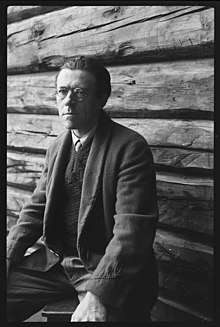
Most people learn to save themselves by artificially limiting the content of consciousness.
Peter Wessel Zapffe (18 December 1899 – 12 October 1990) was a Norwegian metaphysician, author, lawyer and mountaineer, noted for his philosophically pessimistic and fatalistic view of human existence.
Quotes
Each new generation asks – What is the meaning of life? A more fertile way of putting the question would be – Why does man need a meaning to life?
- To bear children into this world is like carrying wood into a burning house.
- As quoted in Reflekser i trylleglass: stemmer fra vårt århundre [Magical Reflections : Voices of Our Century] (1998) edited by Haagen Ringnes
The Last Messiah (1933)
- The Last Messiah [Den sidste Messias] (1933)
- One night in long bygone times, man awoke and saw himself.
He saw that he was naked under cosmos, homeless in his own body. All things dissolved before his testing thought, wonder above wonder, horror above horror unfolded in his mind.
Then woman too awoke and said it was time to go and slay. And he fetched his bow and arrow, a fruit of the marriage of spirit and hand, and went outside beneath the stars. But as the beasts arrived at their waterholes where he expected them of habit, he felt no more the tiger’s bound in his blood, but a great psalm about the brotherhood of suffering between everything alive.
That day he did not return with prey, and when they found him by the next new moon, he was sitting dead by the waterhole.
- When a human being takes his life in depression, this is a natural death of spiritual causes. The modern barbarity of 'saving' the suicidal is based on a hair-raising misapprehension of the nature of existence.
- Hvorfor er menneskeslegten da ikke forlængst dødd ut under store vanvidsepidemier? Hvorfor er der bare et forholdsvis ringe antal individer som forkommer fordi de ikke kan holde livspresset ut, – fordi erkjendelsen gir dem mer enn de kan bære? Saavel aandshistorien som iagttagelsen av os selv og andre gir basis for følgende svar: De fleste mennesker lærer at redde sig ved kunstig at redusere sit bevissthetsindhold.
- Why, then, has mankind not long ago gone extinct during great epidemics of madness? Why do only a fairly minor number of individuals perish because they fail to endure the strain of living — because cognition gives them more than they can carry? Cultural history, as well as observation of ourselves and others, allow the following answer: Most people learn to save themselves by artificially limiting the content of consciousness.
To Be a Human Being (1989–90)
- The philosopher Peter Wessel Zapffe in his 90th year (1990 documentary, Tromsø Norway: Original Film AS)
- Each new generation asks – What is the meaning of life? A more fertile way of putting the question would be – Why does man need a meaning to life?
- Man is a tragic animal. Not because of his smallness, but because he is too well endowed. Man has longings and spiritual demands that reality cannot fulfill. We have expectations of a just and moral world. Man requires meaning in a meaningless world.
- The seed of a metaphysical or religious defeat is in us all. For the honest questioner, however, who doesn’t seek refuge in some faith or fantasy, there will never be an answer.
- We come from an inconceivable nothingness. We stay a while in something which seems equally inconceivable, only to vanish again into the inconceivable nothingness.
- Death is a terrible provocation. It appears almost everywhere, presenting a stern but effective scale for both values and ethical standards.
- Death is the most certain and the most uncertain event there is.
- In accordance with my conception of life, I have chosen not to bring children into the world. A coin is examined, and only after careful deliberation, given to a beggar, whereas a child is flung out into the cosmic brutality without hesitation.
- Mankind ought to end its existence of its own will.
- I myself am no longer very much afflicted by the thought of my own death. The synthesis, Peter Wessel Zapffe, did not originate until 1899. It was spared from immediate participation in the horrors of the previous years, and it will not miss what awaits mankind at the end of its vertiginous madness.
- If one regards life and death as natural processes, the metaphysical dread vanishes, and one obtains "peace of mind".
See also
External links
This article is issued from
Wikiquote.
The text is licensed under Creative
Commons - Attribution - Sharealike.
Additional terms may apply for the media files.
